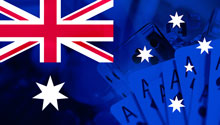Illegal Gambling Sites Blocked by Section 313 of Telecom Act in Australia
 The Australian Communications and Media Authority (ACMA) recently made an announcement that all Internet Service Providers (ISPs) within the country would have to adhere to its rulings on illegal gambling sites by blocking access to them. Now, all offshore gambling platforms that are in violation of the terms of Australia’s Interactive Gambling Act 2001 are blocked, thanks to Section 313 of the Telecommunications Act.
The Australian Communications and Media Authority (ACMA) recently made an announcement that all Internet Service Providers (ISPs) within the country would have to adhere to its rulings on illegal gambling sites by blocking access to them. Now, all offshore gambling platforms that are in violation of the terms of Australia’s Interactive Gambling Act 2001 are blocked, thanks to Section 313 of the Telecommunications Act.
Looking at the Interactive Gambling Act of Australia, this legislation was introduced in 2001 and considered all online casino and poker gameplay as illegal for residents of the country. Yet, operators managed to find a loophole in the law’s wording, and in the end, they continued being able to operate within the country. The language would become more coherent in the Interactive Gambling Amendment Bill 2016 (IGBA16), and this was the first step taken that made it much harder for gambling companies to provide Australians with online betting.
Even though tougher laws were brought into play, some operators managed to continue providing their services to the country’s players. The Australian authorities weren’t about to relent on having the laws adhered to though, which is where the latest move to block illegal gambling sites came from.
"We have been targeting illegal gambling services we know are active in the Australian market through complaints received and monitoring," said the Chair of the ACMA, Nerida O’Loughlin. She went on to state that having the ability to force ISPs into blocking such illegal platforms is quite the valuable weapon for the organisation to utilise.
Section 313 Provides a Key Route for ACMA to Travel Down
The Telecommunications Act of 1997 states in Section 313 – which has the title "Obligations of carriers and carriage service providers" – that carriers and carriage service providers must do their best to "prevent telecommunications networks and facilities from being used in, or in relation to, the commission of offences against the laws of the Commonwealth or of the States and Territories."
By using this particular part of the Act, the ACMA has no trouble in asking ISPs to bring blocks into place on whichever offshore sites it believes are threatening the security of Australia and the people living there. Any time a block is requested, it is necessary to have it approved by the chair, deputy chair, or a senior executive of the ACMA.
Prior to this taking place, it seemed as though the ACMA was satisfied with how the IGBA16 was working in its favour. A report in 2018 suggested that things were proceeding at a much better level with that in place. It even gave figures stating that 33 of the most popular gaming sites operating within Australia had taken the decision to withdraw from the country since the amendment became operational. That was the result of 77 separate investigations that had been conducted by the ACMA.
Firms pulling out of Australia at the time included both PartyPoker and 888 Poker, with both being out of the country by Aug. 31 of 2017. Despite the fact that over 65 companies had opted to take the same route, the ACMA wasn’t satisfied with the additional foreign-based platforms that were still providing their services to the Australian market. This was even after various directors of certain sites were added to the Department of Home Affairs Movement Alert List, which stores biographical data about anyone who could be of concern to immigration.
Whether or not the ACMA will be satisfied by the results of this latest move remains to be seen. But, with new online gambling sites becoming available so frequently, it will take a lot of action for the organisation to manage to block all of them choosing to provide Australia with their gambling services.